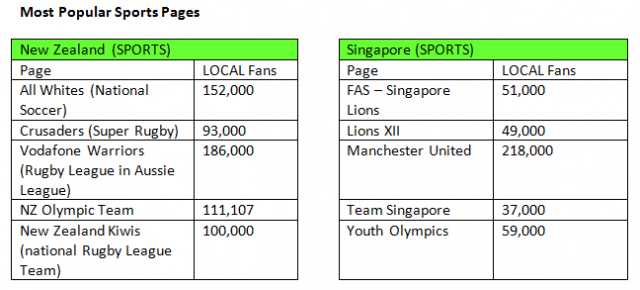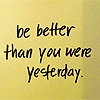Search the Community
Showing results for tags 'Success'.
-
I agree, i prembaree tree oni....... [laugh] University degree 'not vital for success': Khaw Boon Wan Getting good jobs after leaving school more important: Khaw Published on May 05, 2013 8:44 AM By Toh Yong Chuan Singaporeans do not need to be university graduates to be successful, said National Development Minister Khaw Boon Wan yesterday. What is more important is that they get good jobs after leaving school, Mr Khaw told some 160 students and young adults in an Our Singapore Conversation dialogue. "If they cannot find jobs, what is the point? You own a degree, but so what? That you can't eat it. If that cannot give you a good life, a good job, it is meaningless," he added. Mr Khaw was responding to a participant who said the Government should set aside more university places for Institute of Technical Education (ITE) and polytechnic graduates.
- 366 replies
-
- University
- degree
-
(and 2 more)
Tagged with:
-
Hello, I am researching the benefits of running a large radio campaign and I am wondering if anyone here has prior radio advertising experience? My goal is not at all branding, but rather direct sales. I would be directing the radio listeners to my website. So I am wondering how the ROI of radio ads compares to web ads? Does anyone have knowledge of how to purchase and setup a large radio campaign? I went through many resources and checked Advertising Campaign Examples but,I haven't found a clear source for rates and to purchase ads. Any advice? Any help will be appreciated. Thank you.
-
- advertising
- marketing
- (and 6 more)
-
Watched this video and was super inspired to be a good parent for my kids... but then thinking again, asian culture like always want to be safe and don't want pple to fail. How many of us have parents like this? http://edumatters.sg/all-parents-you-have-to-take-2-mins-to-watch-this/
-
At the height of the Commonwealth Games, Singapore looks set to have one of their best games ever. This is fantastic and awesome, and I want to offer the joy and hugs to the whole of Team Singapore. With the games ongoing - I decided to take a look at some stuff so that I could write a blog post about Facebook Support for Sports teams - and it threw up some interesting things... What I see in this simple and straight forward comparison - there is a comparative dearth of support for local teams - why do you think this is, and what can be done about it? here's another excerpt from my post.. In Singapore – there are 218,000 Man U facebook fans and 122,000 Liverpool fans (ranking 1 and 2 respectively in the “Sports” category as measured by Socialbakers). There are FIVE “non Singapore” teams in the top 10. Compare this to New Zealand – the first “Non New Zealand” sports page is the (Australian) NRL – a league that has a New Zealand team competing at number 5. The highest ranking page with no direct New Zealand link is the NBA (American Professional Basketball) at number 9. The first “non New Zealand” TEAM comes in at number 12 (the LA Lakers) Measuring the comparative success using the Commonwealth Games as a proxy - New Zealand has thirty something medals, to Singapore's 6. (some of this is due to a bigger population, with NZ at 4.4 million compared to Singapore's 3.3 million citizens) .
- 3 replies
-
- sports
- commonwealth games
-
(and 3 more)
Tagged with:
-
Good s h i t here so be patient and keep reading to the end. If you're already as successful as you want to be, both personally and professionally, congratulations! Here's the not-so-good news: All you are likely to get from this article is a semi entertaining tale about a guy who failed his way to success. But you might also notice some familiar patterns in my story that will give you confirmation (or confirmation bias) that your own success wasn't entirely luck. If you're just starting your journey toward success—however you define it—or you're wondering what you've been doing wrong until now, you might find some novel ideas here. Maybe the combination of what you know plus what I think I know will be enough to keep you out of the wood chipper. Let me start with some tips on what not to do. Beware of advice about successful people and their methods. For starters, no two situations are alike. Your dreams of creating a dry-cleaning empire won't be helped by knowing that Thomas Edison liked to take naps. Secondly, biographers never have access to the internal thoughts of successful people. If a biographer says Henry Ford invented the assembly line to impress women, that's probably a guess. But the most dangerous case of all is when successful people directly give advice. For example, you often hear them say that you should "follow your passion." That sounds perfectly reasonable the first time you hear it. Passion will presumably give you high energy, high resistance to rejection and high determination. Passionate people are more persuasive, too. Those are all good things, right? Here's the counterargument: When I was a commercial loan officer for a large bank, my boss taught us that you should never make a loan to someone who is following his passion. For example, you don't want to give money to a sports enthusiast who is starting a sports store to pursue his passion for all things sporty. That guy is a bad bet, passion and all. He's in business for the wrong reason. My boss, who had been a commercial lender for over 30 years, said that the best loan customer is someone who has no passion whatsoever, just a desire to work hard at something that looks good on a spreadsheet. Maybe the loan customer wants to start a dry-cleaning store or invest in a fast-food franchise—boring stuff. That's the person you bet on. You want the grinder, not the guy who loves his job. For most people, it's easy to be passionate about things that are working out, and that distorts our impression of the importance of passion. I've been involved in several dozen business ventures over the course of my life, and each one made me excited at the start. You might even call it passion. The ones that didn't work out—and that would be most of them—slowly drained my passion as they failed. The few that worked became more exciting as they succeeded. For example, when I invested in a restaurant with an operating partner, my passion was sky high. And on day one, when there was a line of customers down the block, I was even more passionate. In later years, as the business got pummeled, my passion evolved into frustration and annoyance. On the other hand, Dilbert started out as just one of many get-rich schemes I was willing to try. When it started to look as if it might be a success, my passion for cartooning increased because I realized it could be my golden ticket. In hindsight, it looks as if the projects that I was most passionate about were also the ones that worked. But objectively, my passion level moved with my success. Success caused passion more than passion caused success. So forget about passion. And while you're at it, forget about goals, too. Just after college, I took my first airplane trip, destination California, in search of a job. I was seated next to a businessman who was probably in his early 60s. I suppose I looked like an odd duck with my serious demeanor, bad haircut and cheap suit, clearly out of my element. I asked what he did for a living, and he told me he was the CEO of a company that made screws. He offered me some career advice. He said that every time he got a new job, he immediately started looking for a better one. For him, job seeking was not something one did when necessary. It was a continuing process. This makes perfect sense if you do the math. Chances are that the best job for you won't become available at precisely the time you declare yourself ready. Your best bet, he explained, was to always be looking for a better deal. The better deal has its own schedule. I believe the way he explained it is that your job is not your job; your job is to find a better job. This was my first exposure to the idea that one should have a system instead of a goal. The system was to continually look for better options. Throughout my career I've had my antennae up, looking for examples of people who use systems as opposed to goals. In most cases, as far as I can tell, the people who use systems do better. The systems-driven people have found a way to look at the familiar in new and more useful ways. To put it bluntly, goals are for losers. That's literally true most of the time. For example, if your goal is to lose 10 pounds, you will spend every moment until you reach the goal—if you reach it at all—feeling as if you were short of your goal. In other words, goal-oriented people exist in a state of nearly continuous failure that they hope will be temporary. If you achieve your goal, you celebrate and feel terrific, but only until you realize that you just lost the thing that gave you purpose and direction. Your options are to feel empty and useless, perhaps enjoying the spoils of your success until they bore you, or to set new goals and re-enter the cycle of permanent presuccess failure. I have a friend who is a gifted salesman. He could have sold anything, from houses to toasters. The field he chose (which I won't reveal because he wouldn't appreciate the sudden flood of competition) allows him to sell a service that almost always auto-renews. In other words, he can sell his service once and enjoy ongoing commissions until the customer dies or goes out of business. His biggest problem in life is that he keeps trading his boat for a larger one, and that's a lot of work. Observers call him lucky. What I see is a man who accurately identified his skill set and chose a system that vastly increased his odds of getting "lucky." In fact, his system is so solid that it could withstand quite a bit of bad luck without buckling. How much passion does this fellow have for his chosen field? Answer: zero. What he has is a spectacular system, and that beats passion every time. As for my own system, when I graduated from college, I outlined my entrepreneurial plan. The idea was to create something that had value and—this next part is the key—I wanted the product to be something that was easy to reproduce in unlimited quantities. I didn't want to sell my time, at least not directly, because that model has an upward limit. And I didn't want to build my own automobile factory, for example, because cars are not easy to reproduce. I wanted to create, invent, write, or otherwise concoct something widely desired that would be easy to reproduce. My system of creating something the public wants and reproducing it in large quantities nearly guaranteed a string of failures. By design, all of my efforts were long shots. Had I been goal-oriented instead of system-oriented, I imagine I would have given up after the first several failures. It would have felt like banging my head against a brick wall. But being systems-oriented, I felt myself growing more capable every day, no matter the fate of the project that I happened to be working on. And every day during those years I woke up with the same thought, literally, as I rubbed the sleep from my eyes and slapped the alarm clock off. Today's the day. If you drill down on any success story, you always discover that luck was a huge part of it. You can't control luck, but you can move from a game with bad odds to one with better odds. You can make it easier for luck to find you. The most useful thing you can do is stay in the game. If your current get-rich project fails, take what you learned and try something else. Keep repeating until something lucky happens. The universe has plenty of luck to go around; you just need to keep your hand raised until it's your turn. It helps to see failure as a road and not a wall. I'm an optimist by nature, or perhaps by upbringing—it's hard to know where one leaves off and the other begins—but whatever the cause, I've long seen failure as a tool, not an outcome. I believe that viewing the world in that way can be useful for you too. Nietzsche famously said, "What doesn't kill us makes us stronger." It sounds clever, but it's a loser philosophy. I don't want my failures to simply make me stronger, which I interpret as making me better able to survive future challenges. (To be fair to Nietzsche, he probably meant the word "stronger" to include anything that makes you more capable. I'd ask him to clarify, but ironically he ran out of things that didn't kill him.) Becoming stronger is obviously a good thing, but it's only barely optimistic. I do want my failures to make me stronger, of course, but I also want to become smarter, more talented, better networked, healthier and more energized. If I find a cow turd on my front steps, I'm not satisfied knowing that I'll be mentally prepared to find some future cow turd. I want to shovel that turd onto my garden and hope the cow returns every week so I never have to buy fertilizer again. Failure is a resource that can be managed. Before launching Dilbert, and after, I failed at a long series of day jobs and entrepreneurial adventures. Here are just a few of the worst ones. I include them because successful people generally gloss over their most aromatic failures, and it leaves the impression that they have some magic you don't. When you're done reading this list, you won't have that delusion about me, and that's the point. Success is entirely accessible, even if you happen to be a huge screw-up 95% of the time. My failures: Velcro Rosin Bag Invention: In the 1970s, tennis players sometimes used rosin bags to keep their racket hands less sweaty. In college, I built a prototype of a rosin bag that attached to a Velcro strip on tennis shorts so it would always be available when needed. My lawyer told me it wasn't patentworthy because it was simply a combination of two existing products. I approached some sporting-goods companies and got nothing but form-letter rejections. I dropped the idea. But in the process I learned a valuable lesson: Good ideas have no value because the world already has too many of them. The market rewards execution, not ideas. From that point on, I concentrated on ideas that I could execute. I was already failing toward success, but I didn't yet know it. Gopher Offer: During my banking career, in my late 20s, I caught the attention of a senior vice president at the bank. Apparently my b.s. skills in meetings were impressive. He offered me a job as his gopher/assistant with the vague assurance that I would meet important executives during the normal course of my work, which would make it easy for him to strap a rocket to my backside—as the saying roughly went—and launch me up the corporate ladder. On the downside, the challenge would be to survive his less-than-polite management style and do his bidding for a few years. I declined his offer because I was already managing a small group of people, so becoming a gopher seemed like a step backward. I believe the senior vice president's exact characterization of my decision was "[expletive] STUPID!!!" He hired one of my co-workers for the job instead, and in a few years that fellow became one of the youngest vice presidents in the bank's history. I worked for Crocker National Bank in San Francisco for about eight years, starting at the very bottom and working my way up to lower management. During the course of my banking career, and in line with my strategy of learning as much as I could about the ways of business, I gained an extraordinarily good overview of banking, finance, technology, contracts, management and a dozen other useful skills. I wouldn't have done it any differently. Webvan: In the dot-com era, a startup called Webvan promised to revolutionize grocery delivery. You could order grocery-store items over the Internet, and one of Webvan's trucks would load your order at the company's modern distribution hub and set out to service all the customers in your area. I figured Webvan would do for groceries what Amazon had done for books. It was a rare opportunity to get in on the ground floor. I bought a bunch of Webvan stock and felt good about myself. When the stock plunged, I bought some more. I repeated that process several times, each time licking my lips as I acquired ever-larger blocks of the stock at prices I knew to be a steal. When the company announced that it had achieved positive cash flow at one of its several hubs, I knew that I was onto something. If it worked in one hub, the model was proved, and it would surely work at others. I bought more stock. Now I owned approximately, well, a boatload. A few weeks later, Webvan went out of business. Investing in Webvan wasn't the dumbest thing I've ever done, but it's a contender. The loss wasn't enough to change my lifestyle. But boy, did it sting psychologically. In my partial defense, I knew it was a gamble, not an investment per se. What I learned from that experience is that there is no such thing as useful information that comes from a company's management. Now I diversify and let the lying get smoothed out by all the other variables in my investments. These failures are just a sampling. I'm delighted to admit that I've failed at more challenges than anyone I know. As for you, I'd like to think that reading this will set you on the path of your own magnificent screw-ups and cavernous disappointments. You're welcome! And if I forgot to mention it earlier, that's exactly where you want to be: steeped to your eyebrows in failure. It's a good place to be because failure is where success likes to hide in plain sight. Everything you want out of life is in that huge, bubbling vat of failure. The trick is to get the good stuff out.
-
from Yahoo: "C.L.I.F 2" makes a splash in China By Syahida Kamarudin | From Cinema Online Exclusively for Yahoo! Newsroom
-
many of them became the richest men in Southeast Asia through hard work and entrepreneurship [thumbsup] Liem Sioe Liong (林绍良) aka Sudono Salim - born in Fujian in 1916 - son of a farmer - ventured to Indonesia at age 20 - owned Salim Group, well-known as Property King - became Indonesia's richest man in the 90s - became targeted by Indonesian rioters during Asian Currency Crisis 97/98 - passed away in 2012 Ng Teng Fong (黄廷芳) - born in Fujian in 1928 - came to Singapore at age 6 - became property tycoon - owned Far East Organisation - Singapore's richest man since 2000s - passed away in 2010 Khoo Teck Puat (邱德拔) - born in Malaysia in 1917 - started as clerk in bank - founded Malaysia Banking - owned Goodwood Group and Goodwood Park Hotel - largest shareholder in Standard Chartered - migrated to Singapore in 1994 - Singapore's richest man in the late 90s - passed away in 2004 Robert Kuok Hock Nien (郭鹤年) - born in Malaysia in 1923 - started as office boy and ventured into sugar refineries - well-known as Sugar King - owned Shangri-La Hotels and Wilmar International - Malaysia's richest man since 2000s Sam Goi Seng Hui - born in Fujian in 1949 - came to Singapore at age of 6 - started with engineering workshop - bought and expanded Tee Yih Jia - well-known as Popiah King - ventured into properties and hotels in China - Singapore's top 11 richest man in 2011 Zia Gokmi aka Dhanin Chearavanont (谢国民) - born in Thailand in 1938 - Father Chia Ek Chor came to Thailand from Swatow, China in the 1920s - ventured into agricultural business - owned CP Group - Thailand's richest man Henry Sy (施至成) - born in Xiamen in 1924 - arrived at Philippines at young age - started by selling used shoes - established departmental store in 1970s - well-known as Retail King - Philippines' richest man in the 2000s George Lien Ying Chow (连瀛洲) - born in Guangdong in 1907 - arrived at Singapore at age of 13 - started as a shipping clerk - founded OUB after WWII - sold OUB to UOB in 2001 - one of Singapore's richest men - passed away in 2004
-
After joining this forum for just a few months, I realised that are many successful people here. As I am a old punk trying to learn the ways of the world, I would like you guys to share your stories of how you made it, how you reach the success that you have attain....please this is not a haolian thread and please do not flame participants....all I want is to learn so that I can reach the level of success they have achieved one day. Success can be measured in many ways, be it rich, spiritual, physical...and so on...it doesn't matter...let's share our stories so that everyone can benefit and take a step forward in their lives
-
hope schumacher makes a comeback man Michael Schumacher is convinced that he and Mercedes now have all the ingredients they need to be successful in Formula 1 and remains utterly confident that his squad can be a title-winner. Although Schumacher's second season back in F1 has so far not seen much improvement over his difficult comeback year, he says more progress has been made than the results suggest. "Probably last year I wasn't where I wanted to be," he admitted in an interview with the official F1 website. "But this year I would say nothing is missing. All ingredients for success are here - we now to have arrange and optimise them. "Then we will be on the go, just like Red Bull is now. I know that we will do it." Schumacher reiterated that he never expected Mercedes to immediately continue the results it achieved as Brawn in 2009, suggesting that he always knew the team's title success that year was an anomaly. "Of course we would have wanted faster development - and a faster swing onto victory lane - after Ross [brawn] had won both titles in 2009," he said. "But that was the exception to the rule. I have been racing long enough to understand that it takes at least three years to push a team to the very top. "I know that good things come to those who wait. I am absolutely sure we are on the right track and that we are doing all we can to be successful in the end." He also shrugged off the criticism his form this year has received. "I am aware that there are many out there mouthing off about me, but I have been in the business long enough to know what is really important - to stay calm and work in a goal-oriented way on what we want to achieve," Schumacher said. He added: "In reality everything happens so quickly in Formula 1. If I have a good race here, who cares about Turkey two weeks ago? You have to free your mind and not ponder what might have been. It is useless to look back. You have to concentrate all your energy on your goals."
- 3 replies
-
- Schumacher
- Success
-
(and 2 more)
Tagged with:
-
Mercedes GP team principal Ross Brawn said driver Michael Schumacher has rediscovered his edge. The German finished ninth in the drivers' championship last season, but the seven-time World Champion was fastest on day two of testing at Jerez. "It would be a tremendous boost for Formula 1 if he succeeds," Brawn told BBC Radio Northampton. "We had a quiet year with Michael last year. Now he's looking sharp and he might surprise a few people." Brawn commented that this will be the season where Schumacher, who said he was "slightly concerned" about the pace of the new Mercedes , showed the quality that brought him two world titles with Benetton and five with Ferrari. "He's not been involved in the sport for three years, and undoubtedly in that time, certain edges go soft. I think they're sharp again now," stated Brawn. If we can do a great car then there's no reason why he or Nico Rosberg shouldn't win races Mercedes GP team principal Ross Brawn "I've heard the comments that he's tarnishing his image because he's not winning races, but he's loving what he's doing. He's not worried what people think about him." Despite his success in Jerez, the German used Pirelli's super soft rubber tires and Red Bull driver Mark Webber told Yahoo! Eurosport that Schumacher's pace in testing had been "a little show for Germany". Brawn, who worked with Schumacher at Benetton and Ferrari before he brought him out of retirement to join Mercedes GP last season, disagreed with that assessment. "He wasn't showboating [in testing]. We didn't set out to do a low lap time," said Brawn. "We didn't have a good car last year - we didn't hold up our side of the bargain - but if we can do a great car then there's no reason why he or Nico Rosberg shouldn't win races." http://news.bbc.co.uk/sport2/hi/motorsport...one/9399262.stm
-
- Michael
- Schumacher
- (and 4 more)
-
my parents bought a timeshare package about 9 yrs ago for $10k + $7k. but we never made use of it. then last month, my dad got a call from a timeshare company in Burlington Sq.(beside SLS) offering to buy back his package for the same price ??!! so far i have only heard and read about the negative side of timeshare companies. anyone ever had success selling back your timeshare or heard of other's experiences ?
-
How would do define success for yourself and how does that differ or similiar to what the average Singaporean thinks of as success. Most of us will admit having money is important as a criteria for a defined successfully peson, but what is it that you would wish to do with that money. Buy cars or property so that others will defined you as successful or get your children to the Harvard or Oxford or buying all the blink gold chains to show you have the $? Or even having people love you can be a define successful person? How would you define success?
-
GENEVA (AFP) -
-
old folks always say that how much material things we own in this life is already "planned" by destiny. i find it to be quite true. there are some people with little education but are successful. e,g Fandi, Zoe, Fann. if you are not destined to be successful, no amount of hard work will help.
-
read much abt the good product of Auto RX think there is a thread on it sometime back but cannot find it already anyway, just want to find out if there's any bro here in Singapore find good success after doing the Auto RX treatment? personally, i'm into the second rinse phase. then this happens, noticed that the engine oil burn and coolant got 'used' up too during these phase the sound is like loud 'tick-tick-tick', then from the side mirrors can observe a cloud of white smoke (previously only 'tick-tick-tick' sound but no white smoke) did an extensive search, and from Bitog that it occurs to some who are in the same phase. Oil burn. one guy suggest just to top up the oil and continue to use dino oil for the next oil change. then it shld be fine... after which can try syn or semi-syn oil i do hope so.











